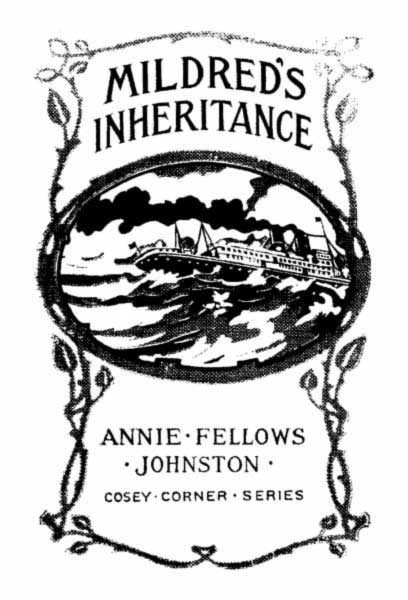
Title: Mildred's Inheritance; Just Her Way; Ann's Own Way
Author: Annie F. Johnston
Illustrator: Diantha W. Horne
Release date: November 22, 2005 [eBook #17133]
Most recently updated: December 13, 2020
Language: English
Credits: Produced by David Garcia, Janet Blenkinship and the Online
Distributed Proofreading Team at https://www.pgdp.net (This
file was produced from images generously made available
by The Kentuckiana Digital Library)

| Works of | |
|---|---|
| Annie Fellows Johnston | |
| The Little Colonel Series | |
| (Trade Mark) | |
| The Little Colonel | $ .50 |
| The Same. Holiday Edition | 1.25 |
| The Giant Scissors | .50 |
| The Same. Holiday Edition | 1.25 |
| Two Little Knights of Kentucky | .50 |
| The Same. Holiday Edition | 1.25 |
| The Little Colonel Stories | 1.50 |
| (Containing in one volume the three stories, "The | |
| Little Colonel," "The Giant Scissors," and | |
| "Two Little Knights of Kentucky.") | |
| The Little Colonel's House Party | 1.50 |
| The Little Colonel's Holidays | 1.50 |
| The Little Colonel's Hero | 1.50 |
| The Little Colonel at Boarding-School | 1.50 |
| The Little Colonel in Arizona | 1.50 |
| The Little Colonel's Christmas Vacation | 1.50 |
| Other Books | |
| Joel: A Boy of Galilee | 1.50 |
| Big Brother | .50 |
| Ole Mammy's Torment | .50 |
| The Story of Dago | .50 |
| Cicely | .50 |
| Aunt 'Liza's Hero | .50 |
| The Quilt that Jack Built | .50 |
| Flip's "Islands of Providence" | .50 |
| Mildred's Inheritance | .50 |
| In the Desert of Waiting | .50 |
| The Three Weavers | .50 |
| Keeping Tryst | .50 |
| Asa Holmes | 1.00 |
| Songs Ysame (Poems, with Albion Fellows | |
| Bacon) | 1.00 |
L.C. PAGE & COMPANY
200 Summer StreetBoston, Mass.
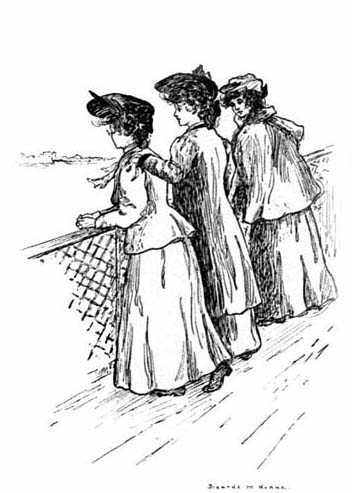
Author of "The Little Colonel" Series, "Big Brother,"
"The Story of Dago," "Joel: A Boy of Galilee," etc.

Boston
L.C. Page & Company
1906
Copyright, 1899 By the Trustees of the Presbyterian Board of Publication and Sabbath-school Work
Copyright, 1906 By L.C. Page & Company (INCORPORATED)
All rights reserved
First Impression, May, 1906
COLONIAL PRESS Electrotyped and Printed by C.H. Simonds & Co. Boston, U.S.A.

| PAGE | |
| Mildred's Inheritance | 1 |
| Just Her Way | 27 |
| Ann's Own Way | 55 |

| PAGE | |
| "Three pretty college girls leaned over the railing of the upper deck" | Frontispiece |
| "Before the day was over the two were talking together like old friends" | 5 |
| "Sat down on the battered little box to wait" | 11 |
| "She read that poor Muffit had overtaxed her eyes" | 21 |
| "The passing of the village omnibus was an exciting event" | 29 |
| "She and Miss Barbara pored over a map of Washington" | 42 |
| "'I wish Daisy Avery could see her now,' she muttered, savagely" | 47 |
| "Sat perched among its guarded branches" | 56 |
| "It was the box that held the green kid shoes" | 63 |
| "Ann followed gingerly in their wake" | 69 |
As the good ship Majestic went steaming away from the Irish coast, one sunny September morning, three pretty college girls leaned over the railing of the upper deck, watching the steerage passengers below. With faces turned to the shore which they might never see again, the lusty-throated emigrants were sending their song of "Farewell to Erin" floating mournfully back across the water.
"Oh, look at that poor old grandmother!" exclaimed one of the girls. "There; that one sitting on a coil of rope with a shawl over her gray head. The pitiful way she looks back to land would make me homesick, too, if I were not already on my way home, with all my family on board, and all the fun of the sophomore year ahead of me. Let's go down to the other end of the deck, where it is more cheerful."
They moved away in friendly, schoolgirl fash[Pg 2]ion, arm in arm, intent only on finding as much enjoyment as possible in every moment of this ocean voyage. A young English girl, dressed in deep mourning, who had been standing near them, followed them with a wistful glance; then she turned to look over the railing again at the old woman on the coil of rope.
"I wish that I could change places with her," thought the girl. "She is so old that she cannot have many homesick years in store, while I—left alone in the world at seventeen, and maybe never to see dear old England again—" The thought brought such an overwhelming sense of desolation that she could not control her tears. Drawing her heavy black veil over her face, she hurriedly made her way to her deck-chair, and sank down to sob unseen, under cover of its protecting rugs and cushions.
This was the first time that Mildred Stanhope had ever been outside of the village where she was born. The only child of an English clergyman, the walls of the rectory garden had been the boundary of her little world. She could not remember her mother, but with her father for teacher, playmate, and constant companion, her life had been complete in its happiness.
[Pg 3]If the violets blooming within the protecting walls of the old rectory garden had suddenly been torn up by the roots and thrown into the street, the change in their surroundings could have been no greater than that which came to Mildred in the first shock of her father's death. She had been like one in a confused dream ever since. Some one had answered the letter from her mother's brother in America, offering her a home. Some one had engaged her passage, and an old friend of her father's had taken her to Liverpool and put her on board the steamer. Here she sat for the first three days, staring out at the sea, with eyes which saw nothing of its changing beauty, but always only a daisy-covered mound in a little churchyard. All the happiness and hope that her life had, ended in that.
"Who is the pretty little English girl?" people asked when they passed her. "She doesn't seem to have an acquaintance on board."
"I never saw such a sad, hopeless face!" exclaimed one of the college girls whom the others called "Muffit." "If she were an American girl I'd ask her to walk with us. But English [Pg 4]girls are so reserved and shy, and I am afraid it would frighten her."
If Muffit could have known, that cold, reserved manner hid a heart hungry for one friendly word. It was the third day out before any one spoke to her. She had been warned against making the acquaintance of strangers, but one look at the gentle-voiced, white-haired lady who took the chair next her own, disarmed every suspicion. The lady was dressed in deep mourning, like herself, and she had a sweet, motherly face that drew Mildred irresistibly to her. Before the day was over the two were talking together like old friends. When she saw how the girl grieved for her father, she tried to draw her away from her sorrow by questioning her about her future.
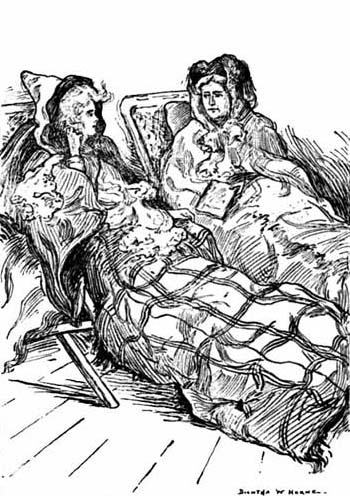
Mildred answered with a shiver. "Oh, I try not to think about that at all. I have never seen Uncle Joe or any of his family, and everything must be so strange and queer in America. Now, if they lived in India I would not dread going half so much; for there would be something homelike in feeling that I was still under the protection of our queen. I cannot bear to think of leaving the ship, for it will be like leav[Pg 5][Pg 6][Pg 7]ing the last bit of home, to step from under the dear old Union Jack. 'A stranger in a strange land,'" she added, her lips quivering.
"No, dear, not as strange as you think," added the lady, with a motherly hand-clasp. "Don't you know that one corner of our country is called New England, in loving remembrance of the old; that your blood flows in our veins regardless of dividing seas, and gives us the same heritage of that proud past which you hold dear? Don't you know that thousands of us go back every year, like children of the old homestead, drawn by all those countless threads of song and story, of common interests and aims and relationships that have kept the two nations woven together in the woof of one great family?
"Let me tell you a bit of personal sentiment that links me to the old town of Chester on the River Dee. There is a house there that, until recently, was in the possession of my husband's family for nobody knows how many generations. Thousands of travellers go every year to see the inscription over its door. Once, over two hundred years ago, an awful plague swept the town, and every family in it lost one or more of its [Pg 8]household. Only this one house was spared, and in grateful memory of its escape there was carved over the door the inscription:
"That became the family motto, and it is engraved here in my wedding-ring. The beautiful thought has helped me over many times of perplexity and sorrow, and has become the inspiration of my life. Because we can trace it back to that place, I have grown to love every stone in the quaint old streets of Chester."
She sat twisting the plain gold circlet on her finger for a moment, and then added thoughtfully: "In the light of her history America might well set that inscription over her own door: 'God's providence is mine inheritance.' It would be none the less appropriate because it reaches back past the struggling colonists and past the Mayflower to find the roots of that faith in the mother country, in a little English town beside the Dee.
"No, my dear," she exclaimed, looking up at Mildred; "it is not a land of strangers you are going to. We sing 'America' and you sing 'God Save the Queen,' and we both feel some[Pg 9]times that there is a vast difference between the songs. But they are set to the same tune, you know, and to alien ears, who cannot understand our tongue or our temperament, they must sound alike."
Life seemed very different to Mildred when she went to her stateroom that night, and her cheery companion inspired her with so much hope before the voyage was over that she began to look forward to landing with some degree of interest. How much of her new-found courage was due to the presence of her helpful counsellor Mildred did not realize until she came to the parting. They were standing at the foot of the gangplank in the New York custom-house.
"I am sorry that I cannot stay to see you safe in your uncle's care," the lady said, "but my son tells me there is barely time to catch the next train to Boston. Good-bye, my child. If you get lonely and discouraged, think of the motto in my wedding-ring, and take it for your own."
The next instant Mildred felt, with a terrible sinking of the heart, that she was all alone in the great, strange, new world.
Following the directions in her uncle's let[Pg 10]ter, she pushed her way through the crowds until she came to the section marked "S," where he was to meet her. There was no one in sight who bore any resemblance to the description he had written of himself. She stood there until her trunk was brought up, and then sat down on the battered little box to wait.
An hour went by, and she began to look around with frightened, nervous glances. A half-hour more passed. The crowds had diminished, for the officials were making their custom-house examinations as rapidly as possible. All around her the sections were being emptied, and the baggage wheeled off in big trucks. The newsboys and telegraph agents had all gone. A great fear fell suddenly upon her that her uncle was never coming, and that she would soon be left entirely alone in this barnlike, cavernous custom-house, with its bare walls and dusty floors; and night was coming on, and she had nowhere to go.
She was groping in her pocket for a handkerchief to stop the tears that would come, despite her brave efforts to wink them back, when some one spoke to her. It was the [Pg 11][Pg 12][Pg 13]pretty college girl whom the others had called Muffit.
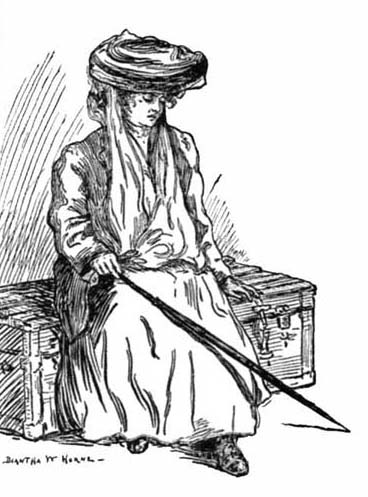
"Are you having trouble with your baggage too?" she asked, kindly. "One of our trunks was misplaced, and they would not examine anything until it was found. It is here at last, thank fortune, so that we shall not be delayed much longer. Mamma and I have noticed you waiting here, and wondered if you were in the same predicament. Papa says that he will be so glad to help you in any way he can, if you need his assistance." She did not add that her mother had said, "I can't go away with any peace of mind until I see that child safe in somebody's hands."
"There is some dreadful mistake!" sobbed Mildred. "My uncle was to meet me here, and I do not know what to do!" She buried her face in her handkerchief, and the next minute "Muffit's" mother had her arms around her. Then she found that the girl's name was not Muffit, but Mildred, like her own, Mildred Rowland.
When Mildred Stanhope told Mrs. Rowland her name, that motherly woman exclaimed, "Oh, Edward! What if it were our daughter [Pg 14]left in such a trying position! She shall just come to the hotel with us and stay until we hear from her uncle. Wasn't it fortunate that that old trunk delayed us so long! We might have hurried off and never known anything about you. Well, it's all right now. Mr. Rowland shall telegraph to your uncle, and we will keep you with us until he comes."
The next two days were full of strange experiences to Mildred. The rush and roar of the great city, the life in the palatial hotel, with its seeming miles of corridors and hundreds of servants, bewildered her. In response to Mr. Rowland's telegram the reply came: "Joseph Barnard died last Wednesday. Call for letter Blank Hotel." The message was signed Derrick Jaynes. The letter, which was brought up an hour later, bore the same signature. It had been written at the request of Mrs. Barnard by her minister. It told Mildred of her uncle's sudden death, occurring the day that she left Liverpool, and had been sent to the hotel to which Mr. Barnard had intended to take his niece, Mrs. Barnard supposing that her husband had given Mildred that address in case of any slip in making connections.
[Pg 15]The kindly old minister seemed to realize the unhappy position in which the young girl was placed, and gave minute directions regarding the journey she would have to take alone, while Mr. Rowland arranged for her comfort in the same fatherly way he would have done for his own Mildred. "What would I have done without you?" she exclaimed, in a choking voice, as she clung to Mrs. Rowland at parting. "Now I shall be adrift again, all alone in the world, as soon as you unclasp your hand."
"No, Providence will take care of you, dear," answered Mrs. Rowland. "Just keep thinking of that motto you told me about, and let us hear from you when you are safe in Carlsville."
Easter had always come to Mildred with the freshness of country meadows, with cowslips and crocuses, with the soft green of budding hedgerows and a chorus of twittering bird-calls in the old rectory garden. This year, after her long, dreary winter in Carlsville, she looked out on the roofs of the smoky little manufacturing town, and saw only red brick factories and [Pg 16]dingy houses and dirty streets. The longing for the spring in her old English home lay in her heart like a throbbing pain. "Oh, papa," she sobbed, resting her arms on the window-sill and laying her head wearily down, "do you know all about it, dearest? Oh, if you could only tell me what to do!"
A week before, her aunt, Belle Barnard, had said, in her sickly, complaining voice, "Well, Mildred, I don't like to tell you, but I have been talking the matter over with the girls, and they think that we might as well be plain-spoken with you. Everybody thought that your Uncle Joe was a rich man, and so did we till we got the business settled up. Now we find that after the lawyers are paid there won't be enough for us all to live on comfortably. At least there wouldn't be if it wasn't for a small inheritance that Maud and Blanche have from their grandmother, and, of course, they couldn't be expected to divide that with you, and deny themselves every comfort; so I don't see any help for it but for you to get a place in some store or millinery shop, or something. We have to move in a smaller house next week."
[Pg 17]The week had nearly gone by, and Mildred was growing desperate. Unfitted for most work, either in strength or education, she scarcely knew for what to apply, and went from one place to another at her aunt's recommendation, feeling like a forlorn little waif for whom there was no place anywhere in the world.
One afternoon she sat by her window, looking out on the early April sunshine, trying, with the hopelessness of despair, to form some plan for her future. "Why didn't I have a grandmother to leave me an inheritance like Blanche and Maud?" she thought, bitterly.
Then her thoughts flew back to the day on shipboard, when she had heard of the old house in Chester and the inscription in her companion's wedding-ring. "And she told me to take that motto for my own," she whispered through her tears. "'God's providence is mine inheritance!' If it is, the time has certainly come for me to claim it, for I have never been in such desperate need."
The few times that winter that Mildred had gone to any service, had been in the church in the next block. Its gray stone walls, with masses of overhanging ivy, reminded her of the [Pg 18]one she had loved at home. God had seemed so very far away since she came to Carlsville. She prayed as she had always done before, but her prayers seemed like helpless little birds, unable to rise high enough to carry her pleadings to the ear of the great Creator who had so many cries constantly going up to him. She had not realized before how big the world was and how small a part her little affairs played in the plan of the great universe. A longing for some closer communion than she had known before drew her toward this church, of which Derrick Jaynes was the rector. The door was unlocked, and the slender black figure slipped in unobserved. In the big empty church her desolate little moan was all unheard and unheeded, as she knelt at the altar sobbing, "Oh, God, I don't know what will become of me if you do not help me now! Oh, show me 'mine inheritance!'"
Three times during that week she went back to that same place with that same cry. The last time she went some one was in the church. It was the organist, practising some new Easter music for the next day's services. A burst of triumphant melody greeted her as she noise[Pg 19]lessly opened the side door. She met the florist coming out, for he had just completed the decorating, and the place was a mass of bloom. All around the chancel stood the tall, white Easter lilies, waiting, like the angels in the open tomb, with their glad resurrection message—"He is risen!"
As Mildred stood with clasped hands, an unspoken prayer rising with the organ's jubilant tones and the incense of the lilies, she felt a touch on her shoulder. It was the white-haired old minister.
"I saw you come in," he said, in a whisper. "I have been trying all day to find time to call at your aunt's to talk with you. You do not know, but I have been in correspondence several times this winter regarding you, with a Mr. Rowland. He wrote me when you first came that his wife and daughter were deeply interested in you, and wanted to be kept informed of your welfare. This morning I received a letter which needs your personal answer. I am very busy now, but shall try to see you Monday in regard to it."
Mildred's heart beat rapidly as he handed her a large, businesslike-looking letter and [Pg 20]went softly out again. In the dim light of the great stained-glass windows she read that poor Muffit had over-taxed her eyes, and that they were so badly affected she could not go back to school for the spring term. In looking for some one who could be eyes for their Mildred, so that she might go on with her studies at home, they had thought of this other Mildred, the little English girl, whose low, musical voice had been so carefully trained by her father in reading aloud. By one of these strange providences which we never recognize as such at the time, Mr. Rowland had broken his spectacles the last evening of Mildred's stay in New York. She had offered to read the magazine article which he was particularly anxious to hear, and they had been charmed by her beautifully modulated voice. Now the letter had been written to offer her a liberal salary and a home for the summer.
Mildred gave a gasp of astonishment. It was not the almost miraculous finding of what she had come to seek that overwhelmed her. It was a feeling that swept across her like a flood, warm and sweet and tender; the sudden realization that a hand stronger than death and [Pg 21][Pg 22][Pg 23]wise above all human understanding had her in its keeping. She dropped on her knees at the flower-decked altar-rail, with face upturned and radiant; no longer lonely; no longer afraid of what the future might hold. She had come into her inheritance.
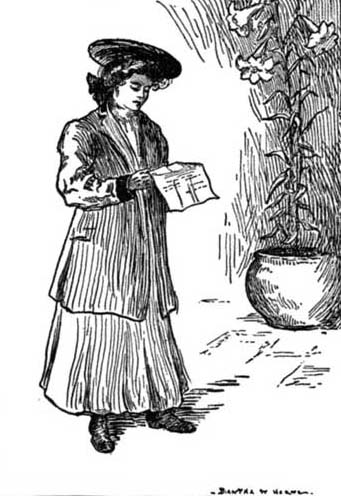
Kneeling there she looked back again to her father's lowly grave in the little churchyard across the seas, but she saw it no longer through hopeless tears. Into her heart the great organ had pealed the gladness of its exultant Easter message, and in the deep peace of the silence which followed, the fragrance of the lilies breathed a wordless "Amen!"
"Look out of the window, Judith! Quick! Mrs. Avery is going away!" Judith Windham, bending over the sewing-machine in her bedroom, started as her little sister's voice came piping shrilly up the stairs, and leaving her chair she leaned out of the old-fashioned casement window.
There were so few goings and comings in sleepy little Westbrooke, that the passing of the village omnibus was an exciting event. With an imposing rumble of yellow wheels it rattled up to Doctor Allen's gate across the road. A trunk, a dress suit case, and numerous valises were hoisted to the top of it, and the doctor's family flocked down to the gate to watch the departure of the youngest member of their household, Marguerite.
It had been four years since the first time they watched her go away, a nineteen-year-old [Pg 28]bride. Since then they had visited her, severally and collectively, in her elegant apartments in Washington, but this had been her first visit home. Judith, watching her flutter down the walk with her hand in the old doctor's, thought she looked even prettier and more girlish than on her wedding-day. Married life had been all roses for Marguerite.
"She's the same dear old harum-scarum Daisy she always was, in spite of the efforts of her Lord Chesterfield of a husband to reform her," thought Judith, fondly, as her old schoolmate, catching sight of her at the window, waved her parasol so wildly that the staid old 'bus horses began to plunge.
The girls had bidden each other good-bye the night before, but Marguerite stopped in the midst of her final embracings to call out, "Good-bye, again, Judith. Remember, I shall expect you the first of February." Then the slender figure in its faultless tailor-made gown disappeared into the omnibus. Her husband, a distinguished, scholarly man, lifted his hat once more and stepped in after her. The door banged behind them, and, creaking and swaying, the ancient vehicle moved off in a cloud of dust.
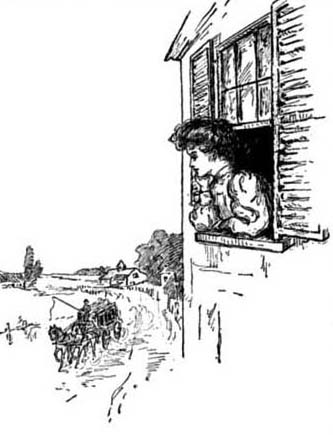
Feeling that something very bright and interesting had dropped out of her life, Judith went back to the sewing-machine. As she picked up her work an involuntary sigh escaped her.
"That's a very sorry sound, Judith. Are you tired?"
It was a sympathetic voice that asked the question, and Judith looked up with a smile. Her mother's cousin stood in the doorway—a prim little old spinster, who had been their guest for several days. Like Marguerite, she, too, had come back to her native village after an absence of four years, but not to her father's house. She was all alone in the world, save for a few distant relatives who called her Cousin Barbara. After a short visit, she would go away for another long absence, but not, like Marguerite, to a life full of many interests and pleasures. She had only her music pupils in a little Pennsylvania mining town, and a room in a boarding-house.
"Come in, Cousin Barbara," said Judith, cordially. "I was sighing over Marguerite's departure. You know she was my best friend at school, and I have missed her so much since her marriage. The other girls in our class have [Pg 32]all gone away to teach or take positions somewhere, except the two who married and settled down here in Westbrooke; and they have such different interests now. All they can talk about is their housekeeping or their babies. Most of the boys have gone away, too. I don't wonder. Anybody with any ambition would get away from such a place if it were within the range of possibilities."
Cousin Barbara had seated herself in a low rocking-chair and was pulling the basting threads from a finished garment. "Listen!" she said, "isn't that Amy calling again?" An excited little voice came shrilly up the stairs.
"Look, Judith! Mrs. Avery is coming back again! What do you suppose is the matter?"
The omnibus dashing down the road stopped suddenly at the gate opposite. The door burst open, and the dignified Mr. Avery, in undignified haste, ran breathlessly toward the house, while Marguerite called out a laughing explanation to her friend at the window.
"I left my watch on the dressing-table and my purse with my trunk keys in it, and we've only six minutes to catch the train. Isn't that just my way? Look at Algernon run! I [Pg 33]wouldn't have believed it of him. Well, it has given me another chance to remind you that you are to come to me in February. You needn't shake your head. I'll not take 'no' for an answer. You're so good at planning, Judith, I'm sure you can arrange it some way."
Then as her husband returned, red-faced and breathless, she leaned out of the 'bus, and laughingly blew an airy kiss from her fingertips.
"That's just like her!" exclaimed Judith. "She's as irresponsible and careless as a child. She was always late to school, and losing her pencils and forgetting her books. We used to call her 'Daisy Dilly-dally.' She's such a dear little butterfly, though, and it doesn't seem possible that we are the same age—twenty-three. I feel like a patriarch beside her."
"So she has invited you to visit her in Washington," began Miss Barbara. "I am glad of that. It will be such a fine change for you."
To her surprise, the gray eyes filled with tears, and in her effort to wink them back Judith did not reply for a moment. Then she answered, lightly, "Yes; it would be a golden [Pg 34]opportunity if I could only afford to accept, but the wolf is still at the door, Cousin Barbara. It has stood in the way of everything I ever longed to do. Even when a child I used to hear so much about it that I thought it was a veritable flesh-and-blood wolf. Many a night I slipped out of bed and peered through the curtain, all a-shiver. I wanted to see if its fiery eyeballs were really watching at the door. I wanted to see them if they were there, and yet was terrified to peep out for fear they were. Even now it seems more than a mere figure of speech. Often I dream of having a hand-to-hand struggle with it, but I always conquer it in the end—in my dreams," she added, with a gay little laugh. "And that is a good omen."
That cheery laugh was the key-note of Judith's character, Miss Barbara thought. All her life she had taken the pinch of poverty bravely for the sake of her invalid mother and the three younger sisters whom she was now helping through school. Gradually she had shouldered the heavy responsibilities laid upon her, until she had settled down to a routine of duty, almost hopeless in its monotony. Miss Barbara noted with keen eyes that a careworn look had [Pg 35]become the habitual expression of the sweet girlish face, and she sat wishing with all her heart that she were something herself besides a poorly paid little music teacher with the wolf lurking at her own door. As she wound the basting threads on a spool she planned the rose-coloured future Judith should have if it were only in her power to give it.
Judith must have felt the unspoken sympathy, for presently she burst forth: "If I could only go away, just once, and have a real good time, like other girls, just once, while I am young enough to enjoy it, I wouldn't ask anything more. I've never been ten miles outside of Westbrooke, and I'm sure no one ever longed to travel more than I. I never have any company of my own age. Our old set is all gone, and my friends are either elderly people or the school-children who come to see the girls. And they all are so absorbed in the trivial village happenings and neighbourhood gossip.
"What I want is to meet people out in the world who really do things,—men like Mr. Avery, for instance; Daisy is always entertaining distinguished strangers, artists and authors and musicians. Friendship with such cultured, [Pg 36]interesting people would broaden the horizon of my whole life. I have a feeling that if I could once get away, it would somehow break the ice, and things would be different ever after." Then she added, with a tinge of bitterness that rarely crept into her voice, "I might as well plan to go to the moon. The round-trip ticket alone, without the sleeping-car berth, would be at least forty dollars, wouldn't it?"
Miss Barbara nodded. "Yes, fully that. It costs me almost that much to go to Packertown and back, and that, you know, is a few hours this side of Washington."
There was silence for several minutes, while Judith, already ashamed of her outburst, stitched twice round the skirt she was making for Amy. Then she said in a cheerful tone that somehow forbade any return to the subject, "Tell me about Packertown, Cousin Barbara. How did you happen to stray off there after a music class?"
The trip to Washington was mentioned no more that summer, but Miss Barbara understood.
It was the middle of September when the old yellow omnibus rolled up for Miss Barbara and [Pg 37]her trunk. This time there was no returning in mad haste after forgotten property. With a precision that was almost fussiness, she had packed her trunk days before her departure, and her bonnet was on an hour before train time.
"I can't help it," she said, calmly, when Judith remonstrated. "It's just my way. I have a horror of keeping any one waiting. Habitual disregard of punctuality in the keeping of an engagement or a promise is a sort of dishonesty, in my opinion. I suppose I do carry it to an extreme in minor matters, but it is better to do that than to cause other people needless anxiety and trouble."
Miss Barbara was mounted on her hobby now, and she ambled vigorously along until Amy, with a sigh of relief, announced that she heard wheels. Amy had heard Cousin Barbara's views more than once, when a missing shoe button, a torn glove, or an unanswered note, claimed immediate attention.
"Remember, Judith," said Miss Barbara, at parting, "if anything should happen to make it possible for you to go to Washington, be sure and let me know. I want to arrange for you to [Pg 38]stop with me a week on your way." But even as Judith spoke her thanks, she shook her head. She had stopped building air-castles.
Winter came early to Westbrooke. Mrs. Allen ran over occasionally with a letter from Marguerite, who was an erratic correspondent, sometimes sending interesting daily bulletins of sixteen or twenty pages, sometimes breaking a month's silence by only a postal card. They rarely heard from Miss Barbara, but, one snowy day late in January, Amy dashed in from the post-office with a letter to Judith, addressed in her unmistakable precise little hand. She wrote:
"The new year began for me with a great pleasure, Judith dear. An old bill, which I had been unable to collect for so long that I crossed it off my books two years ago, was paid very unexpectedly, and I feel as if I had fallen heir to a dukedom.
"It is enough to enable you to make your visit to Washington and to pay your board in the room next to mine for two weeks. Maybe there will be enough to get the material for a simple evening gown, and you can make it while [Pg 39]you are here, or at home. It depends on whether you go first to Mrs. Avery or to me. Write to her at once, please, so that I may know when to expect you.
"Oh, my dear child, you do not know the unalloyed pleasure I have already had in anticipating not only your visit to me, but your good times in Washington. I feel that your enjoyment of the outing, which I would have enjoyed so intensely at your age, will, in a way, compensate me for my starved, unsatisfied girlhood, and I am sure you are too generous to refuse me the pleasure.
"Enclosed you will find the check and a card on which I have written all necessary directions as to railroad connections, time-tables, etc."
No girl of fifteen could have been more enthusiastic in her rapturous expressions of delight than Judith, as she danced into her mother's room, waving the check. Amy looked on in amazement.
"I didn't know that sister could get so excited," she said to her mother, afterwards.
"It is the first great pleasure she has ever had," said Mrs. Windham, with a sigh. "It [Pg 40]means far more to her than a trip to Europe would to Marguerite. We all must help her to make the most of it."
It seemed to Judith that all Westbrooke had heard of her proposed journey before night. Neighbours ran in to talk it over and proffer their assistance. The little old trunk that had gone on her mother's wedding journey was brought down, and the family dropped various contributions into it, from Mrs. Windham's well-preserved black silk skirt, to Edith's best stockings. Amy brought her coral pin and only lace-trimmed handkerchief, begging Judith to wear them when she went to the White House. "Then I can tell the girls they've seen the President of the United States," she said, proudly.
Lillian, next in age to Judith, presented her outright with her Christmas gloves. "Mittens are good enough for Westbrooke," she said. "Just bring me a leaf from Mount Vernon and one from Arlington for my memory book. I can hardly realize that you are really going to see such famous places."
Marguerite's letter in response to Judith's news came promptly. She named a long list of sights which she had planned for Judith to see, [Pg 41]and mentioned a noted violinist who was to visit Washington the following month and had promised to play at the musicale she intended giving on the sixteenth.
"I am sure you will like that better than anything," she wrote. "Make your visit to Miss Barbara first. I wish I could have you come on the first of February, as I invited you to do, but, unfortunately, Mr. Avery's mother and sisters are with us just now, and they occupy all our spare room. They do not expect to stay long after my cousin's reception on the third, however, and I will write as soon as they leave, and let you know just what day to come."
The first week of Judith's visit in Packertown fairly flew by. Miss Barbara was away much of the time, both morning and afternoon, with her music pupils, but Judith busied herself with the making of the dainty white dinner gown, and wove happy day-dreams while she worked. In the evenings she and Miss Barbara pored over a map of Washington until they could locate all the prominent places of interest, and then Miss Barbara brought out a pile of borrowed magazines in which were interesting [Pg 42]descriptions of those very places, and they took turns in reading aloud.
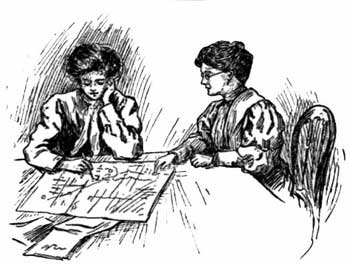
When the dress was completed they had a little jubilee. Judith wore it one evening, with its dainty flutter of ribbons, for Miss Barbara to admire, and they invited the landlady and her daughter in to have music and toast marshmallows.
"You don't look a day over eighteen," Miss Barbara declared. "You ought to wear white all the time."
"It is given only to saints and the 'lilies that [Pg 43]toil not' to do that," answered Judith, gaily. "I am satisfied to be arrayed just on state occasions." And then because she was so happy she seized the little music teacher and waltzed her round and round before the mirror. "It's all your doing, you blessed Cousin Barbara! See how you have metamorphosed me."
Several days later she stood idly turning the calendar. "This is the day of the reception," she said; "the Averys will certainly be going home soon, and I ought to hear from Marguerite."
But no letter came the next day, nor the next, nor all the following week, although she went to the post-office several times daily.
It grew dull waiting, with Miss Barbara gone so much, and with nothing to do. She read the few books at her disposal, she paced up and down in the two little back bedrooms that she and Miss Barbara occupied. She took long walks alone, but the little mining town was even smaller than Westbrooke, and she found scant material with which to fill her letters home.
The two weeks for which she had been invited came to an end, and Judith grew desperate [Pg 44]over her fruitless trips to the post-office. She knew that Miss Barbara had just made the payment that was due the Building and Loan Association in which she was putting her little earnings, and would be almost penniless until the end of another term. Besides, she had accepted all that she was willing to take from the hard-worked little music teacher.
"I have packed my trunk and am going home to-morrow, Cousin Barbara," she announced. "Mr. Avery's family have evidently stayed longer than Daisy expected, and she can't have me. Maybe some of them are ill."
"Then she should have written and told you so," said Miss Barbara, waxing so indignant over the neglect of her protégée that she grew eloquent on the subject of her hobby—punctuality, especially in correspondence.
"I suppose you wouldn't want to write again?" she suggested.
But Judith shook her head. "Oh, no, no!" she insisted; "Daisy understands perfectly that I can stay here only two weeks. I explained the situation fully in my letter. I mailed it myself, and I am sure that she received it. And I couldn't thrust myself upon her, you [Pg 45]know. She has probably forgotten all about her invitation by this time; this visit doesn't mean as much to her as to me."
"But I can't bear to be disappointed after going so far," said Miss Barbara. "She'll surely write in a few days. You'll just have to stay another week. I can arrange for that long. The landlady wants the room after the twenty-first for a permanent boarder, but you can't go until then."
In spite of all Judith's protestations, Miss Barbara kept her, and never did a week drag by so slowly. It snowed incessantly. Miss Barbara was unusually busy. Judith took a severe cold that confined her to the house. Her eyes ached when she attempted to read, and all she could do was to pace up and down the room and look out of the window, or watch the clock in feverish impatience for Miss Barbara to return with the mail.
But not until the sixteenth, the day of the musicale, did she lose hope. When the hour came in which she should have been listening to the famous violinist in Marguerite's elegant drawing-rooms, she threw herself on the bed and cried as if her heart would break. It had [Pg 46]been years since she had given away to her emotions as she did then, but the disappointment was a bitter one. She must go back home without even a glimpse of the city of her dreams, and without meeting a single interesting person. True, she had had a pleasant visit with Cousin Barbara, but they both had thought of it as only the stepping-stone to what lay beyond. Then at the thought of Miss Barbara's disappointment, second only to her own, she cried again. And again for her mother's disappointment and the girls', and her mortification when it should be discussed in every house in Westbrooke. She sobbed so long that finally she fell into a deep sleep of exhaustion.
Miss Barbara, coming in later in the twilight, found her lying on the bed, with a feverish flush on her cheeks. The grieved, childlike droop of the sensitive little mouth told its own story, and Miss Barbara set her lips sternly together.
"I wish Daisy Avery could see her now," she muttered, savagely; "it's cruel to disappoint any one so. I don't care what the cause is, it's wickedly cruel to be so careless."
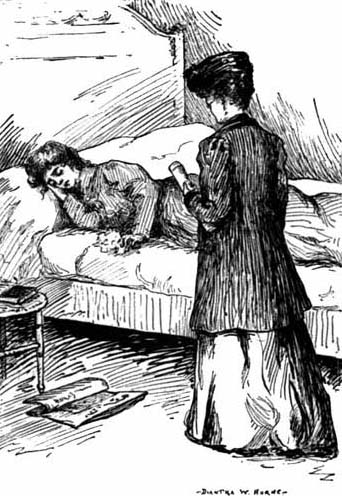
Four days later Judith went home. In the [Pg 47][Pg 48][Pg 49]course of a week a letter was forwarded to her from Packertown. It was from Marguerite:
"How can you ever forgive my abominable carelessness? I intended to answer immediately after our guests left, but Mr. Avery and I were invited to a little house-party in the country, and I thought a few days wouldn't make any difference to you. Then, after our return, so many things interfered and the days slipped by so fast, that the month was nearly gone before I realized it. But then I always have been such a poor correspondent.
"I hope that it hasn't inconvenienced you any, and that you have been having a good visit with Miss Barbara. You know my unfortunate way of doing things, and I'm sure you'll forgive me, like the darling you always were.
"We shall look for you to-morrow on the six o'clock train. Don't disappoint us, for we both shall be at the station to meet you.
"Devotedly,
Judith read the letter aloud to the girls and then dropped it in the fire, watching it without [Pg 50]a word, as it curled up in the flame. How long she had waited for that careless little letter! How anxiously she had hoped for it! A few days sooner it would have brought untold happiness. Now it was only a hollow mockery. Well, it was all over now. Her hopes were in ashes like the letter. How high they had burned! And the little evening gown she had taken such pleasure in making—there would never be any occasion fit for its wearing in Westbrooke. She might as well fold it away. The letter had come too late. And she was asked to forgive it—the disappointment that would sting all her life long—simply because it was Daisy's way.
The silence was growing uncomfortable. Amy kept casting frightened glances at her sister's white, tense face. "Oh, dear," she sighed, finally, "if this had only been in a story it wouldn't have ended so dreadfully. Something nice would have happened just at the last minute to make up for the disappointment."
"But it isn't in a story," said Judith, slowly, rising to leave the room. "And nothing can compensate for such a disappointment. It will hurt always."
[Pg 51]As the door closed behind her the girls exchanged sympathizing glances. "If there had even been a good reason," sighed Lillian, "but it was only carelessness. And the trouble of it is, the world is full of Daisy Averys."
"Ann! Ann! Have you been home yet to feed the chickens?" The call came from the doorway of a big old farmhouse, where a pleasant-faced woman stood looking out over the October fields.
The answer floated down from an apple-tree near by, where a ten-year-old girl sat perched among its gnarled branches. She had a dog-eared book of fairy tales on her knee, and was poring over it in such blissful absorption that she had forgotten there were such things in all the world as chickens to be fed.
"No'm, Aunt Sally, I haven't done it yet, but I'll go in a minute," and she was deep into the story again.
"But, Ann," came the voice after a moment's waiting, "it is nearly sundown, and you ought to go right away, dear. Lottie says that you have been reading ever since you came home [Pg 56]from school, and I am afraid that your mother wouldn't like it."
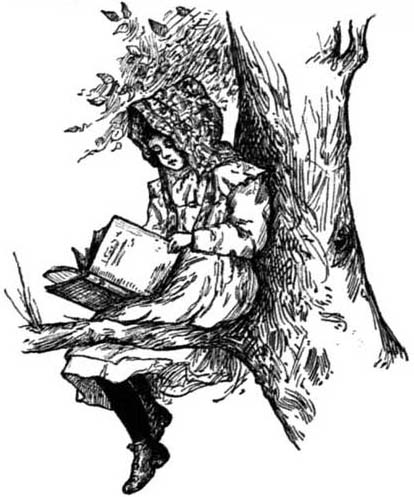
"Oh, bother!" exclaimed Ann under her breath, shutting the book with an impatient [Pg 57]slap; but she obediently swung herself down from the limb, and went into the house for the key. The little cottage where Ann Fowler lived stood just across the lane from her Uncle John's big brown house, where she was staying while her mother was away from home. Mrs. Fowler, who had been called to the city by her sister's illness, had taken little Betty with her, but Ann could not afford to miss school and had been left in her Aunt Sally's care. The arrangement was very agreeable to the child, for it meant no dish-wiping, no dusting, no running of errands while she was a guest. Her only task was to go across the lane twice a day and feed the chickens.
As Ann came out of the house swinging the key, her aunt called her again: "Mrs. Grayson was here to-day. She came to invite you and Lottie to a Saturday afternoon romp with her little girls to-morrow. She's asked a dozen boys and girls to come and play all afternoon and stay to tea. Her oldest daughter, Jennie, is going to give a Hallowe'en party at night, but she'll send you home in the carryall after tea, before the foolishness begins."
"Didn't she invite us to the party too?"[Pg 58] asked Ann, who had heard it discussed at school all week by the older girls and boys of the neighbourhood, until her head was full of the charms and mysteries of Hallowe'en.
"Why, of course not," was the answer. "Jennie Grayson is fully eighteen years old and wouldn't want you children tagging around."
"But we can't work any charms in the afternoon," said Ann, "They won't come true unless you wait till midnight to do 'em. I found a long list of 'em in an old book at home and gave them to Jennie. I think she might have asked me. I'd love to try my fate walking down cellar backwards with a looking-glass in one hand and a candle in the other. They say that you can see the reflection of the man you're going to marry looking over your shoulder into the glass."
"Why, Ann Fowler!" exclaimed her aunt in a horrified tone, lifting up both hands in her astonishment. "I didn't think it of a little girl like you! Don't you go to putting any foolish notions like that into Lottie's head. Fate indeed! It would be more like your fate to fall down cellar and break the looking-glass [Pg 59]and set yourself on fire. No, indeed! Lottie shouldn't go to such a party if she had a dozen invitations."
Ann hurried away wishing that she had not spoken. She had an uncomfortable feeling that her aunt considered her almost wicked, because she had made that wish. As for her aunt, she was saying to her husband, who had just come in, "Well, well! that child has the queerest notions. Her mother lets her read entirely too much, and anything she happens to get her hands on. And she sets such store by her clothes, too. I believe if she had her own way she'd be rigged out in her Sunday best the whole week long. I'm glad that Lucy isn't like her."
No one, judging by the appearance of the resolute little figure trudging across the lane, would have imagined that Ann's besetting sin was a love of dress. She was such a plain old-fashioned little body, with her short brown hair combed smoothly back behind her ears. But the checked sunbonnet, the long-sleeved gingham apron, and the stout calfskin shoes were no index of Ann's taste. They were of her mother's choosing, and Ann's mother was not [Pg 60]a woman whose decisions could be lightly set aside.
In a bureau drawer in the guest-chamber of the little cottage was a dress that Ann had been longing to put on for six months. It was of dainty white organdy, made to wear over a slip of the palest green silk, with ribbons to match. And carefully wrapped in a box, with many coverings of tissue paper, was a pair of beautiful pale green kid shoes. Ann had worn them only once, and that was in the early spring, when she had gone to a cousin's wedding in the city. Many a Sunday morning since, she had wept bitter tears into that drawer, at not being allowed to wear the costume to church.
"Just see how beautiful they are, mother," she would say tearfully, touching the beribboned dress with admiring fingers and caressing the shoes. "By the time I have another chance to wear them in the city they will be too small for me, and I shall have to give them to Betty. I don't see why I can't wear them out here."
"Because they are not suitable, Ann," her mother would answer. "You would look ridiculous going through the fields and along the dusty roads in such finery, and among all these [Pg 61]plainly attired country people you would appear overdressed. I hope that my little daughter is too much of a lady in her tastes to ever want to call attention to herself in that way, especially at church."
"But, mother," the little girl would sob protestingly, and then Mrs. Fowler's decided voice would silence her.
"Hush, Ann! Close the drawer at once. You cannot wear them." That would settle the matter for awhile, but the scene had been repeated several times during the summer. Now it was next to the last day of October, and no suitable occasion had arrived for Ann to wear them.
As she stood scattering the corn to the chickens, a daring plan began to form itself in her busy brain. The trees suggested it; the trees of the surrounding woodland, decked out in their royal autumn colouring of red and yellow, that the sunset was just now turning into a golden glory.
"Even the trees get to wear their best clothes sometimes," she said to herself. "They look like a lot of princesses ready for a ball. Oh, that's what they are," she exclaimed aloud.[Pg 62] "They are all Cinderellas. October is their fairy godmother who has changed their old every-day dresses into beautiful ball-gowns, for them to wear on Hallowe'en. I don't see why I couldn't wear my best clothes too, to-morrow." Then she went on, as if she were talking to the old white rooster: "I'd rather be dressed up and look nice than to play, and I needn't romp at all. If we were to begin trying charms after supper, Mrs. Grayson would be almost sure to let us stay until after Jennie's party begins, and then all the big boys and girls would see my lovely clothes. Nobody out here knows I've got 'em. And then if I should go down cellar with a looking-glass and candle and somebody should look over my shoulder, I'd be so glad that the first time he ever saw me I was all in green and white like the Princess Emeralda, with my beautiful pale green party shoes on."
Alas! Aunt Sally was right. The flotsam and jetsam of too many sentimental stories and fairy tales were afloat in the child's active mind. A few minutes later she had gathered the eggs and put them away in the pantry. Then she stepped into the sitting-room, awed by the solemn stillness that enveloped the usually [Pg 63][Pg 64][Pg 65]cheerful room. How strange and dark it seemed with all the blinds closed! She groped her way across the floor, and tiptoed through the hall as if she were afraid that the great eight-day clock in the corner might hear her and call her back. Its loud tick-tock was the only sound in the house, except her own rapid breathing.
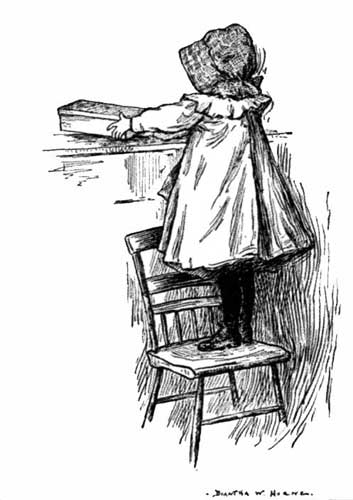
Throwing open a western window, she pushed back the shutters until the guest-chamber was all alight with the glow of the sunset. Then she clutched the handles of the bureau drawer with fingers that twitched guiltily, and gave a jerk. It was locked. For a moment her disappointment was so great that she was ready to cry, but her face soon cleared and she began a search for the keys. Under the rug, in the vases on the mantel, behind photograph frames, into every crack where a key could be hidden, she peered with eager brown eyes. It was not to be found. Finally she climbed on a chair to the highest closet shelf, where she came across something that made her give a cry of delight. It was the box that held the green kid shoes.
"I'll wear this much of my party clothes, anyhow," she declared, scrambling down with [Pg 66]the box in her arms. Then followed a fruitless search for the silk stockings that matched them. They were not in the box with the shoes, where they had always been kept, and a rummage through the drawers showed nothing suitable.
She heard her Aunt Sally's cook blowing the horn for supper before she gave up the search. That night after she and Lottie had gone up to bed, she took her cousin into her confidence.
"Mother hasn't left a thing unlocked but my school clothes," she said. "I can't find a stocking except my red ones and my striped ones and some horrid old brown things. She hasn't left out a single white pair for Sundays; I don't see what she could have been thinking of." Nowadays little girls might not think that such a distressing matter, but twenty-five years ago no stockings but white ones were considered proper for full-dress occasions.
"I'll lend you some," said Lottie obligingly. "I have a pair of fine white lamb's wool that will fit you. They are a little small for me, and ma put them away to keep because grandma knit them herself after she was eighty years old. But I know she would not care if you wore them just once."
[Pg 67]"Then let's get them to-night and not say anything about it until after to-morrow," said Ann. "She might say I ought not to wear the shoes, and I'm just bound to have my own way for once in my life."
When Ann's dark eyes flashed as wickedly as they did then, Lottie always submitted without a word. Opening a big chest in one corner of the room, she began fumbling among the pile of neatly wrapped winter flannels it contained, while Ann held the candle.
"I saw ma put them in this corner," said Lottie. "I am sure. Oh! here they are," she exclaimed, and as she unfolded them she sneezed so suddenly that it nearly put out the candle. "It's the red pepper," she explained. "They're full of it, to keep out the moths. Hold them up and shake them hard."
Several shrivelled red pods fell out as Ann obeyed, and so much loose pepper that they both began sneezing violently. Lottie's mother presently called up the stairs for them to hurry to bed, for they surely must be taking cold.
The next afternoon when Mrs. Grayson's carryall drove down the lane Ann was waiting in front of the cottage, and climbed in before [Pg 68]her Aunt Sally came out to the gate to see them off.
"Tuck the lap-robe around you well," she called. "If I had known it was so cold, I'd have gotten out your hoods instead of those sunbonnets. It really begins to feel as if winter is on the way."
It was a dull gray day with a hint of snow in the air. Several flakes fell before they reached the Grayson farm, and Ann pulled aside the lap-robe more than once to peep at the light green shoes with secret misgivings as to their appropriateness. The wool stockings made them such a tight fit that they pinched considerably, but the pinching was more than compensated for by the shapely appearance of her trim little feet. Besides there was a vast amount of satisfaction to the wilful child in the mere knowledge that she was having her own way.
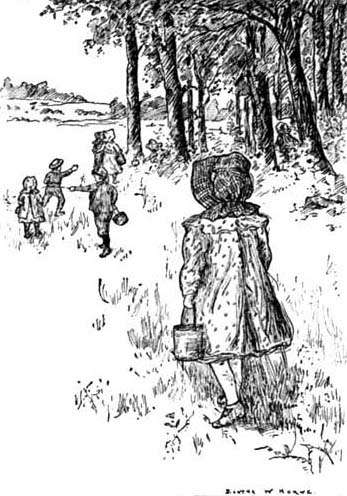
Under ordinary circumstances Ann would have looked back at that afternoon as one of the merriest of her life. She loved the woods like an Indian, and usually was the leading spirit in such exploits as they ventured on that day. They were off to the woods with baskets [Pg 69][Pg 70][Pg 71]and pails as soon as they had all assembled. But for once the late wild grapes hung their tempting bunches overhead in vain. The persimmons, frost-sweetened and brown, lay under the trees unsought by Ann's nimble fingers, and the nuts pattered down on the dead leaves unheeded. While the other children raced down the hills and whooped through the frosty hollows, Ann followed gingerly in their wake, picking her way as best she could through the rustling leaves and across the slippery logs that bridged the little brooks. It was too cold to sit down. She was obliged to keep stirring; so all that miserable afternoon she tagged after the others, painfully conscious of her fine shoes, and a slave to the task of keeping them clean.
"Hi! Ann, what's the matter?" called one of the boys as he noticed her mincing along at the tail-end of the procession instead of gallantly leading the charge as usual. Then his glance wandered down past the checked sunbonnet and the long-sleeved gingham apron to the cause of her leisurely gait.
"My eyes!" he exclaimed with more vigour than politeness. "What made you pull your [Pg 72]shoes so soon for, Ann? They ain't ripe. They're green as gourds."
"Mind your own business, Bud Bailey," was the only answer he received, but from then on what had been her greatest pride became her deepest mortification. For some unaccountable reason, after awhile her feet burned as if they were on fire, and before the afternoon was over the pain was almost unbearable. Lottie found her sitting on a log behind a big tree, with her arms clasped around her knees, rocking back and forth, her eyes tightly closed and her teeth clenched.
"It must be the red pepper in those stockings that burns you so," she said sympathetically. "Come on up to the house and take them off. Lucy will lend you another pair."
But Ann sprang up, fiercely forbidding her to mention it to any one, and dashed into the games with a Spartan disregard of her pain. It was the only way to keep from crying, and she played recklessly on at "prisoner's base," not stopping even when a pointed stick snagged one shoe and a sharp rock cut the other.
It was nearly dark when they went up to the house. Bud Bailey swung his baskets over the [Pg 73]fence and turned to help the girls, but after his unfortunate speech to Ann, she scorned his gallantries. Scrambling to the top rail by herself at a little distance from his proffered hand, she poised an instant, and then sprang lightly down. Unfortunately, she had not looked before she leaped. Bud's basket was in the way, and both feet sank into a great pulpy mass of wild grapes, that instantly squirted their streams of purple juice all over her light shoes. They were splotched and dyed so deeply that no amount of rubbing could ever wipe away the ugly stains. They were hopelessly ruined.
Alas for the Princess Emeralda, who that night might have learned her fate in the charm mirror! It was a Hallowe'en she could never forget, since its unhappiness was both burned and dyed into her memory. She sat through the tea, her feet like hot coals, too miserable to enjoy anything. Afterwards, when Jennie's guests began to arrive, she shrank into a corner, with her dress pulled down far as possible.
It seemed weeks before the carryall was driven up to the door, but at last she was jolting along the frozen road beside Lottie on the way home. Out in the starlight, within [Pg 74]the protecting privacy of her sunbonnet, she could let fall some of the tears she had been fighting back so long. Neither of the children spoke until the carryall turned into the home lane. Then Lottie cried out; "Oh, Ann! There's a light in your house. Your mother must have come back sooner than she expected. Yes, I can see Betty at the window watching for you."
At the gate Ann climbed over the wheel and then turned to exclaim savagely, "I know what you're thinking, Lottie Fowler, even if you don't dare say it. You're thinking you're glad that you are not in my shoes! But I've had my own way, anyhow!" Then with her head high she marched up the path to the house.
But in spite of her brave speech, when she reached the door-step, she stopped to wipe her eyes again on her apron. The carryall drove away, and still she stood there saying to herself with a little sob, "Oh, I wonder if the Prodigal Son was half as much ashamed to go home as I am!"